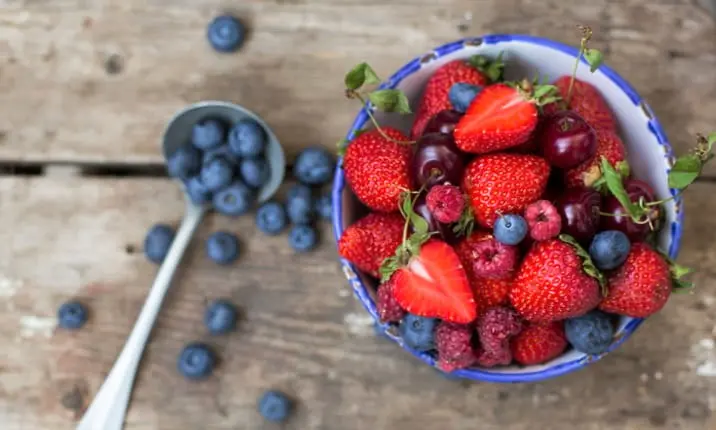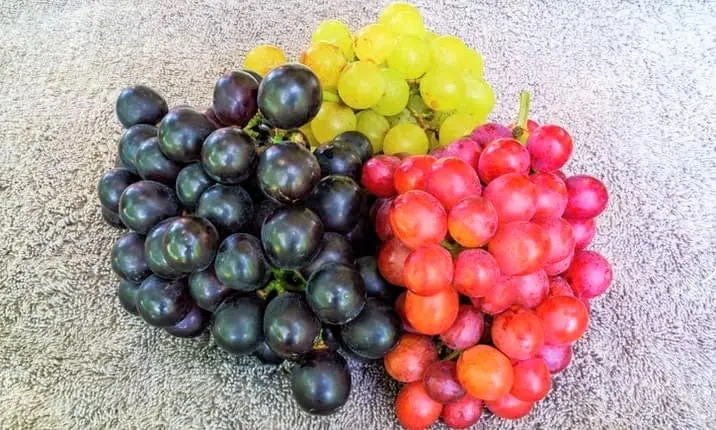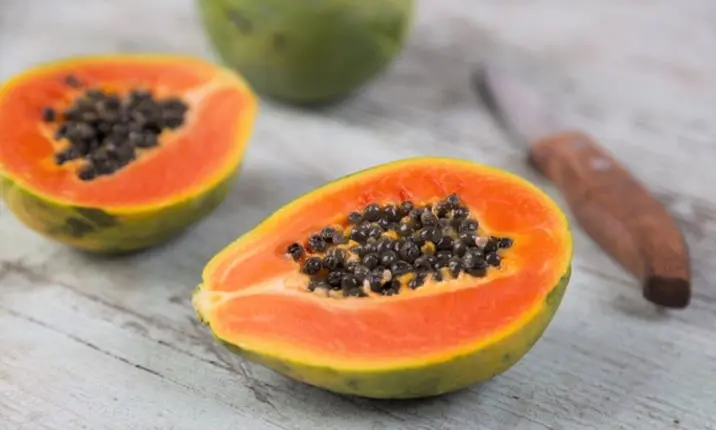In celebration of International Women’s Day, nourish your body and mind by incorporating these nutrient-rich fruits into your daily diet for optimal health and wellness.
Looking to fuel up for a busy day? Fruits are a tasty and convenient option for healthy snacking.
Eating just 2 servings of different fruits every day boosts antioxidant levels, which helps protect your body against free radicals that cause cell damage and illness. Taking a wide variety of fruits, vegetables and other plant-based foods also helps slow the development of chronic disease and cancer.
Not all fruits are created equal though. While all fruits contain essential nutrients such as vitamins, certain fruits stand out for containing high levels of antioxidants and fibre without packing on the calories.
The next time you need a pick-me-up, try snacking on these fruits for a quick energy boost and to promote better immunity and women’s health.
1. Berries
Be it blueberries, blackberries, strawberries or raspberries, all types of berries are rich in antioxidants, vitamins and fibre. The deep red, blue or purple colour of the berries correspond to a high level of antioxidants, specifically anthocyanidins, proanthocyanidins, and ellagic acid.
Studies have linked increased berry consumption with lower risks of heart disease, Alzheimer’s disease and diabetes. Ellagic acid inhibits the growth of cancer cells and has been shown to lower the risk of breast cancer in women.
Besides antioxidants, berries are also rich in vitamin C, which boosts your immune system. Vitamin C also aids in the production of collagen, which helps keep skin healthy and youthful-looking.
Caloric content: A 100g portion of fresh mixed berries (about 3/4 cup) contains around 67 calories.
Tip: Include berries as part of your daily fruit intake. Buy fresh berries when they are in season, and go for frozen berries when they are not. Frozen berries are fine as long as they don’t have added sugar or other additives.
2. Stone fruits
Cherries, peaches, nectarines, apricots and plums are all examples of stone fruits, which are high in fibre, vitamins, and potassium.
Potassium is an essential mineral that helps regulate blood pressure and maintain healthy heart function. Women who consume more potassium have a lower risk of stroke and heart disease.
Stone fruits such as peaches, apricots and cherries contain a group of antioxidants called flavonoids, specifically quercetin and kaempferol, which have been linked to a reduced risk of heart disease and other chronic conditions.
Caloric content: A 100g portion of diced peaches or nectarines (about 2/3 cup) contains around 45 calories, while a 100g portion of cherries without pits (about 2/3 cup) contains around 50 calories.
Tip: Fresh stone fruit are great on their own as a snack, or can be diced and added as a topping to yoghurt, breakfast cereal or salads.
3. Citrus fruits
Citrus fruits like oranges, mandarins, grapefruits, pomelos, lemons and limes are not only a good source of vitamin C, they are also rich in potassium, fibre, and anti-inflammatory antioxidants such as flavonoids and carotenoids (specifically lycopene and beta-carotene).
These nutrients have been shown to have anti-cancer and heart-protective effects, including improvements in blood cholesterol, blood vessel function, and blood sugar. Flavonoids in the skin of citrus fruits stimulate detoxification of carcinogens in the liver.
Citrus flavonoids have also been reported to reduce oxidative stress and improve insulin sensitivity, which is important for women with conditions such as diabetes or polycystic ovary syndrome (PCOS).
Caloric content: A 100g portion of orange segments (about 2/3 cup) contains around 57 calories.
Tip: Citrus fruit skins can be grated over yoghurt, breakfast cereal, salad dressings or steeped in tea or hot water for enhanced flavour.
4. Grapes
Red grapes in particular are packed with fibre, vitamins C and K, and powerful antioxidants, specifically the phytochemical resveratrol. Resveratrol acts on genes that are known to protect healthy cells against ageing, and can slow cancer development. It is also associated with improved heart health.
Additionally, red grapes contain high levels of anthocyanins, similar to that in berries and plums.
Caloric content: A 100g portion of grapes (about 1 cup) contains around 67 calories.
Tip: Sprinkle a handful of grapes or raisins onto your breakfast cereal or salad, or have them as a snack with unsalted mixed nuts. However, take care to consume dried fruit like raisins in moderation as they can be high in sugar.
5. Apples (and pears)
You’ve probably heard the saying, “an apple a day keeps the doctor away”. Fortunately, that’s not a myth. A study of nearly 35,000 women found that consuming apples – along with its close cousin, pears – is associated with a lower risk of death from heart disease. The key nutrients in apples – vitamin C, pectin, polyphenols and fibre – have been associated with anti-inflammatory effects.
Caloric content: A 100g portion of sliced apples (about 1 cup) contains around 57 calories.
Tip: The skins of apples and pears contain most of the fibre and nutrients, so try to eat these fruits with the skin on. Just make sure to wash the fruit thoroughly to remove any dirt, bacteria or pesticides that may be on the surface.
6. Kiwis
Kiwi is a nutrient-dense fruit that offers a variety of health benefits for women. Just one medium-sized kiwi contains over 70% of the recommended daily intake of vitamin C, which is essential for immune function, collagen synthesis, and skin health.
Another important nutrient found in kiwi is folate, which is important for women who are pregnant or planning to become pregnant. Folate plays a key role in the development of the nervous system and can help to prevent certain birth defects. A medium-sized kiwi contains around 10% of the recommended daily intake of folate.
Caloric content: A 100g portion of sliced kiwi (about 1/2 cup) contains around 60 calories.
Tip: There are several types of kiwis available, such as golden kiwis or baby kiwis, each with their own unique flavour and nutritional profile. Try to eat a variety of kiwis to reap the most nutritional benefits, but eat them in moderation due to their high fibre content. The skin of golden kiwis (where most of the fibre is) can be eaten too, but remember to give them a wash first.
7. Papayas
Papayas are another excellent source of fibre, vitamin C, and folate. One cup of papaya provides about 3 grams of fibre, which helps to improve digestion and prevent constipation.
Papayas also contain an enzyme called papain, which can help reduce inflammation in women. This enzyme has been shown to be effective in reducing menstrual cramps and pain associated with endometriosis.
Caloric content: A 100g portion of diced papaya (about 2/3 cup) contains only 39 calories.
Tip: Papayas can be used in a variety of ways, including being cooked in savoury dishes like soups. Papayas can also be blended with low-fat milk or yoghurt to make a healthy smoothie.
8. Melons
Common examples of melons include cantaloupes, honeydew melons and watermelons.
Orange-fleshed fruits like cantaloupes (and vegetables like carrots) are rich in beta-carotene and vitamin A. Beta-carotene is a type of antioxidant that has been shown to reduce the risk of breast cancer in women. It is also important for maintaining healthy skin and promoting wound healing. Vitamin A is crucial for maintaining healthy vision. In fact, vitamin A is needed in the development of the retina, and a deficiency in this nutrient can lead to vision problems.
Similar to cantaloupe, honeydew melon is a good source of lutein, another antioxidant that can help to protect against age-related macular degeneration in women.
Watermelons are also nutrient-dense and an excellent source of hydration, considering they’re made up of more than 90% water.
Watermelons are a rich source of antioxidants, particularly lycopene, which gives the fruit its distinctive red colour. Lycopene has been linked to a lower risk of cervical cancer in women, as well as other types of cancer. Furthermore, watermelons contain citrulline, an amino acid that has been shown to improve blood flow and reduce muscle soreness after exercise. This can be particularly beneficial for women who engage in regular physical activity.
Caloric content: A 100g portion of diced cantaloupe (slightly more than 1/2 cup) contains around 34 calories, while a 100g portion of diced watermelon (about 2/3 cup) contains only around 30 calories.
Tip: Melons can be used in a variety of recipes, from sweet to savoury. Try adding diced melon to salsa or salad dressing, or use them as a topping for yoghurt or oatmeal.
Speak to a dietitian
Eating 2 servings of different fruits daily, such as those mentioned above, can boost immunity, reduce inflammation, and lower your risk of chronic disease. You can also take regular steps towards improving your health by having a balanced diet and choosing whole, unprocessed plant-based foods such as vegetables, beans, nuts, and seeds.
If you're interested in learning more about mindful snacking and maintaining a healthy diet, our experienced dietitians can help. Visit our to learn more.


